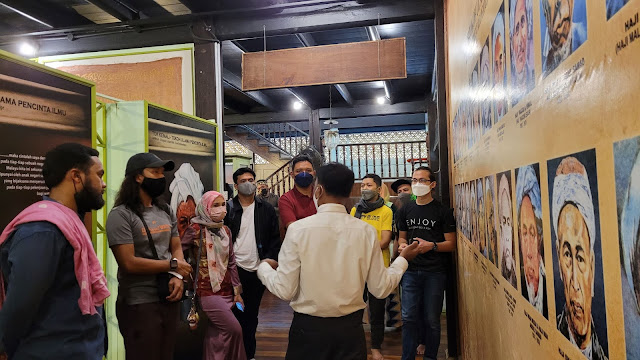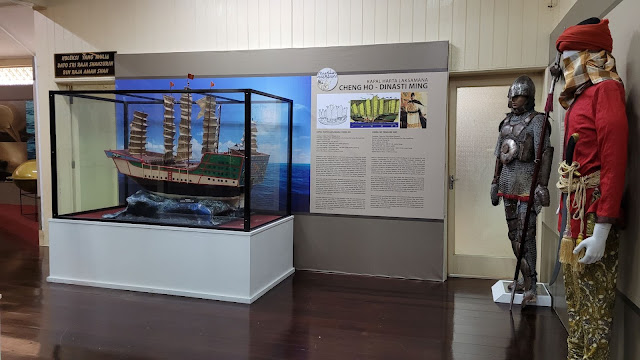I confused
myself.
The one in
KL that most of us visited was the Islamic Arts Museum Malaysia, located on Jalan
Lembah, Tasik Perdana where else the one I went to recently in Kelantan was the
Kelantan Islamic Museum that is situated in Kota Bharu (KB). I was overwhelmed,
and highly encourage you guys to drop by at this place if you are ever in KB.
Before I
even start sharing about the museum, I have to say that the building itself was
amazing. For those who love architecture or old buildings, this is one of the
nice few in KB. It seems that the architecture is a blend of Nusantara and
colonial touch. This double story bungalow was built by wood and embedded with
Islamic calligraphy of verses from the Quran, it was later renovated, and
bricks and cement were used.
One might
not know (or already know) that Kelantan is also coined as ‘Serambi Mekah’ or ‘Verandah
to Mecca’ as it being the hub of Islamic Education hundreds of years ago. Its
traditional education ie ‘sekolah pondok’ or ‘pondok studies’ flourished in
early 19th century and still in existence till this present day, I have also written about it HERE. Known to be
the oldest mosque in Malaysia, this 300 years mosque was originally located in
Kampung Laut in Tumpat and later was moved to Nilam Puri due to recurring
flood. To ensure its safety and that the architecture being preserved, the
authority feels the need to move it. Unlike many modern mosque that is highly
influenced by middle eastern or moor architecture, the Kampung Laut Mosque
characteristic is of Nusantara style where the floor plan is square in shape
that reflected on its roof as well - a three-tiered Meru roof (pyramidal roof).
The museum shared information of this old mosque invaluable architecture, its
carving, the mimbar, its gong (used to call for prayers) as well as belindan
plank (kancapuri); a grave boundary used at the tombs of the Malay Kings and
noblemen.
Showcased beautiful
textiles worn by Muslim that were exported worldwide. Beauty and cleanliness is
highly emphasize in Islam, it is being reflected in clothes, vail, handkerchief
as well as household décor such as curtains, table cloth, tray cover and etc.
Usually the motifs are of floral and cosmos.
Highlighting
the likes of Tok Kenali, Tok Bachok, Tok Selehor, Tok Padang Jelapang and many
more. One that was stressed upon was Tok Kenali, he is the ‘father of Islamic education’.
A Malay theologian and teacher that became the archetype of the rural Malay
religious teacher (alim), he developed the Arabic-language instruction, help
shape the state Majlis Agama Islam or Islamic Religious Council to oversee all
aspects of Islam in Kelantan. This later became the model for the other Malay
states.
"Chinese
treasure ships" (宝船; Bǎo Chuán), used by the commander
of the fleet and his deputies, nine-masted, about 127 metres (417 feet) long,
52 metres (171 feet) wide, with four decks.
Stated the
story on how Nabi Musa A.S or Prophet Moses led his people cross the Red Sea. It
is when Firaun/Pharaoh and his army approaching the Red Sea and about to take
the very same path that Nabi Musa A.S took, the people and Nabi Musa A.S
pleaded to Allah and ask Allah to close the sea. However, Allah commanded Moses
not to smite the sea with his staff again, for Allah's decree was already in
action. When the Pharaoh and his army were midway, Allah commanded the sea to
return to its former state. The waters closed over him, drowning him and his
entire army. Read HERE for the whole story. - Astronomy
Quadrants by Taqi Ad-Din
- Dardanelles
Cannon by Munir Ali- Astrolabe
by Umar Ibn Yusuf- Pinhole
Camera by Al-Haitham
Kelantan
Islamic MuseumJalan
SultanKota BharuKelantanOperating
HoursSaturday -
Thursday : 8.30am to 4.45pmClosed on
FridayEntrance
FeeAdult : RM2.00
(Local), RM4.00 (Foreigner)Kids
:RM1.00 (Local), RM2.00 (Foreigner)ContactKelantan Islamic
Museum : +609-7482266Kota Bharu Tourist
Information Centre : +609-7485534The Ihya’
Ramadan Kelantan 2022 Media Fam Trip is organized by Tourism Malaysia Wilayah
Timur in partnership with all its sponsors.










No comments:
Post a Comment